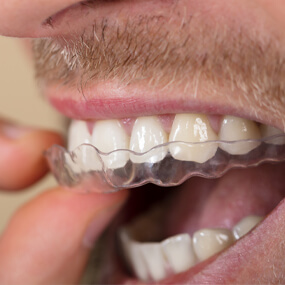Are Dentures the Right Option for You?

Dentures are oral prosthetic devices that are used by more than 41 million Americans and are worn by about 90 percent of all Americans who are missing teeth. Tooth loss is not inevitable, and you should strive to keep your natural teeth throughout your life. But if you do lose teeth or need to have them extracted due to oral health issues, dentures can be an affordable and effective replacement solution, and modern dentures are much more advanced and comfortable than false teeth of the past.
How Dentures Work
Dentures are oral appliances that are designed for your specific mouth and can be removed as needed. These prosthetics can be designed to replace a few teeth or to replace all of the teeth of an arch or even both arches and are an option whether you lost your teeth due to gum disease, tooth decay, or dental damage. Dentures are crafted to mimic your natural teeth. Not only will they look great when you smile, but they will help avoid the way facial muscles can droop when the teeth are not present. It also makes it easier to speak and chew and perform many other activities that people with teeth take for granted.
Who Should Wear Dentures?
The obvious answer is that anyone who is missing teeth should wear dentures. But there are many oral health issues that may indicate that you should have any offending teeth removed and replaced with dentures, such as if you are already dealing with serious tooth decay or very loose teeth.
- Acute Tooth Pain – Tooth pain is an indication of a serious problem. Caught early enough, decay can be removed, and the tooth saved. Acute pain, however, often means that the decay has reached the nerve. It may be possible to save the tooth through root canal treatment, but decay can damage a tooth beyond that point. If a tooth cannot be saved, it must be removed and then be replaced either with an implant or dentures.
- Swollen, Red and Bleeding Gums – Redness, swelling, and easily bleeding are all signs of periodontal disease. Gum disease will eventually undermine the teeth near the inflammation, which can spread throughout the mouth. The infection can also reach connective tissues and supporting bone. Early gum disease is reversible. Advanced gum disease is manageable, but once teeth are undermined, implants and dentures may be the only options.
- Loose or Shifting Teeth – If you noticed teeth that are loose or have shifted position, it is an indication of either advanced gum disease or advanced tooth decay. Shifting teeth are most obvious when gaps are emerging and may not be obvious at all. If you suspect that your teeth are moving, you should visit a dentist as soon as possible in the hopes that your dentist will be able to save the teeth. Often, a dentist will have to take X-rays of the oral cavity in order to determine what is occurring below the gumline.
- Problems Chewing Food – An early indication that you may be dealing with oral health issues and will eventually need dentures is pain or any functional issues associated with chewing your food. Your teeth may have underlying problems that have not yet manifested as chronic pain but disrupt the eating experience. Be mindful that your teeth do not necessarily have to cause discomfort while chewing to be problematic. Many people who experience chronic indigestion, for instance, have that problem because they are unknowingly compensating for oral health issues by taking bigger bites and not chewing their food thoroughly.
- Missing Teeth – If you are already missing teeth, then you should consult with a dentist as soon as possible to discuss either dentures or implants. Even a single missing tooth is a serious concern because it will cause a ripple effect that affects nearby teeth as well as your gums and even your jawbone. People who lose a tooth and do not replace it are much more likely to lose subsequent teeth and develop other oral health issues.
Types of Dentures and Other Treatment Options
If you are missing teeth or you and your dentist decide that you should have certain teeth removed and replaced, you have options. The three main denture options are conventional, immediate, and partial.
- Partial Dentures – Partial dentures are an option for people who still have most of their teeth. These dentures only replace those teeth that are missing and use the natural teeth for support. They are usually anchored by metal clasps that your dentist will precisely install based on the unique shape of your mouth. Partials look like natural teeth, facilitate proper chewing and speaking and prevent shifting of nearby teeth.
- Immediate Dentures – If your dentist must extract one or more of your teeth, then there is the added challenge of the healing period. In some cases, gums need a full two months to heal before they can support conventional dentures or partials. Immediate dentures are a short-term option that helps to protect your gums and teeth and restore function to your mouth while your gums heal. While immediate dentures are effective, they do require you to return to your dentist during the healing period to have the dentures adjusted. This is needed because the gums will shrink and change shape in other ways as they heal.
- Conventional Dentures – Conventional dentures are also called full dentures, and these are the devices most people associate with the term. These dentures can replace all of the teeth in either arch, and you can have dentures for both arches if needed. Since dentures are designed to be permanent and are fabricated based on your particular mouth, it is necessary for the gums to be completely healed before the dentures are made and worn. Modern dentures are natural-looking, precise, and quite comfortable, and in many cases, dentures have integrated supports that eliminate the need to use a denture adhesive.
The Other Option: Implants
Dentures are not the only way to replace missing teeth, and the other option is arguably the superior one. However, there are some important points to consider when it comes to implants. While just about anyone can wear dentures, not everyone is a suitable candidate for implants. If there is gum loss or bone loss, it may be necessary to perform a graft first if that is even possible. If you are a candidate, the other important point to consider is cost. Implants will generally be more expensive than dentures and may not be covered by your insurance.
The Advantages of Dentures
Dentures are extremely beneficial to the people who wear them. Modern dentures are so natural in their appearance that wearers can smile with great confidence. Dentures help to maintain the natural shape of your face, and they ensure that you can chew well and that your speech does not change. People who have dealt with missing teeth for a while are often surprised by the change in their appearance and how much younger they look when they first wear their new dentures.
Consider Dentures to Improve Your Smile
Getting dentures can be a scary prospect for many people, but you have options, and Jeffrey D. Clark, DDS, has substantial experience helping patients acclimate to and care for their dentures. If you think that you may need dentures or currently have them and are experiencing issues, we encourage you to schedule a visit with Dr. Clark at your earliest convenience. Dr. Clark can perform a complete evaluation and consultation and help you make the best decisions for you. Call Scottsdale Cosmetic Dentistry Excellence at 480 585 1853 to make that appointment.




